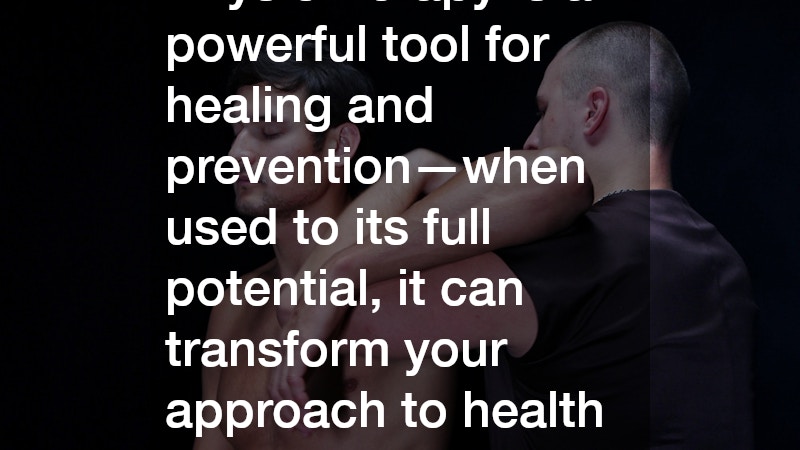Physiotherapy offers more than just relief from aches and pains—it can improve your mobility, enhance recovery from injury or surgery and contribute to your overall wellbeing. However, to make the most out of your sessions and ensure a lasting impact, it’s important to approach physiotherapy proactively. Whether you’re recovering from a sports injury, managing a chronic condition, or seeking preventative care, knowing how to engage fully with your treatment can significantly influence your outcomes.
The following steps provide practical guidance on how to maximise your physiotherapy benefits and achieve your health goals more efficiently.
Understand Your Treatment Plan Thoroughly
The first step to making the most of your physiotherapy is gaining a clear understanding of your personalised treatment plan. Each patient’s condition, history and goals are unique, which is why physiotherapists tailor their approach to the individual. Make it a priority to ask questions during your initial assessment. Seek clarity on the purpose behind each exercise, the expected timeline for progress and how your physiotherapist will measure improvement. This understanding empowers you to participate actively in your recovery rather than just following instructions blindly. If something feels unclear, don’t hesitate to speak up—it’s better to have confidence in the plan you’re following than to risk inconsistent effort due to confusion or uncertainty.
Commit to Consistency Outside the Clinic
Physiotherapy doesn’t begin and end in the treatment room. One of the most crucial aspects of successful rehabilitation or conditioning is consistency, particularly when it comes to home exercise programs. Your physiotherapist will likely assign you specific movements or stretches to perform regularly outside of sessions. These are designed to reinforce what you’ve worked on during appointments and support long-term progress. Skipping them can stall your recovery or even lead to regression. To maximise benefits, treat your prescribed exercises with the same seriousness as in-clinic sessions. Incorporate them into your daily routine, set reminders if needed and track your progress to stay motivated. If pain or discomfort arises while performing these tasks, consult your physiotherapist before continuing, as your program may need adjusting.
Focus on Communication & Feedback
Open communication with your physiotherapist plays a significant role in shaping your treatment. Be honest about your pain levels, limitations and any challenges you face while completing exercises at home. This feedback allows your physiotherapist to fine-tune your plan, ensuring that it aligns with your capabilities and continues to push you safely toward your goals. Reporting changes in your condition—whether positive or negative—helps maintain a clear picture of your recovery journey. Additionally, if you’ve found specific techniques particularly helpful or if you’ve noticed improvements in everyday activities, sharing this information allows your physiotherapist to build upon successful strategies and reinforce your progress.
Maintain a Holistic Health Mindset
To truly maximise the benefits of physiotherapy, consider how other aspects of your lifestyle support or hinder your recovery. Your overall health and habits will influence how quickly and effectively you respond to treatment. Addressing any underlying issues such as poor posture, sedentary behaviour, or stress is equally important. Some physiotherapists may recommend mindfulness practices, ergonomic adjustments, or referrals to other allied health professionals if these areas are affecting your progress. Taking a holistic view of your health can improve the outcome of your physiotherapy and prevent future setbacks.
Set Realistic Goals & Monitor Progress
Goal setting is fundamental to staying motivated and on track throughout your physiotherapy journey. Work with your physiotherapist to establish short-term and long-term goals that are specific, measurable and attainable. Celebrate small wins along the way—they provide encouragement and remind you of how far you’ve come. Keep a journal or log of your progress, noting key milestones and how your body feels before and after certain exercises or treatment sessions.
Be Patient and Trust the Process
Recovery through physiotherapy often requires time, especially in cases involving chronic conditions or post-operative rehabilitation. It can be tempting to rush through the process, skip steps, or become discouraged when improvements aren’t immediate. However, healing is not always linear and every small improvement counts. Trust in the expertise of your physiotherapist and remain committed to the program, even if it feels repetitive or slow. Patience, paired with consistent effort, often leads to the best long-term outcomes. If you experience plateaus in progress, see them as opportunities to reassess and refine your approach, rather than as failures.
Choose the Right Physiotherapy Provider
Your choice of physiotherapy provider can significantly impact the quality of care you receive and, by extension, your results. Look for clinics with qualified practitioners who specialise in your specific condition or area of concern. A supportive and professional environment fosters better communication and enhances the effectiveness of treatment. Reading reviews, seeking referrals and discussing your needs with the practice beforehand can help you find a provider who aligns with your goals and preferences.
Empower Your Recovery Journey
Maximising your physiotherapy benefits involves more than showing up to appointments. It requires a dedicated, informed and proactive approach to your care. By understanding your treatment, committing to consistency, maintaining communication, embracing a holistic lifestyle, setting clear goals and trusting the process, you can accelerate your recovery and enjoy long-term improvements in function and wellbeing. Physiotherapy is a powerful tool for healing and prevention—when used to its full potential, it can transform your approach to health and mobility.

